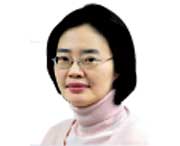Search for identity
Some say that politicians and entertainers are similar in that both have a flair for the stage and a superb appeal to the public that enables them a “public” life in the literal sense. The three leading contenders for the Dec. 19 presidential elections are vibrantly successful people with a singular appeal that smacks of possible new school politics. While Park Geun-hye, the presidential candidate of the conservative Saenuri Party is the daughter of the late former President Park Chung-hee who ruled the country for 18 years, as a female candidate in a country where half of the population are women, she appeals with possible newness. Moon Jae-in, the presidential candidate of the main opposition Democratic United Party, was a close confidant of the late former President Roh Moo-hyun, with his serene soft charisma there is anticipation that he might bring new liberal policies to shape the country. Independent candidate Ahn Cheol-soo, a successful IT guru who wore many other hats before declaring his candidacy for the presidency, is firm and eloquent in his speech, conveying an image that he may be a new generational politician with problem solving skills.
The three are fortunate in that they have to wrestle less with the questions of legitimacy that former Presidents ― mostly former military men-turned-leaders ― had to deal with, although Moon and Ahn are locked in a quest to imbue legitimacy to their cause for a unified candidate.
But what is hitting them is more a question of identity ― it’s a problem that is ironically growing direr as the election nears.
Having long shied away from playing the gender card, Park is promoting her candidacy as that of a “prepared female president” to present a new type of leadership unseen in the country. Moon has been shaping his candidacy as the “elder” of the liberal camp who can be more encompassing than former President Roh Moo-hyun. Ahn is carving his bid into one “who is not dogged by any debt or burden” to any entity or group, and brings with him a freshness to revamp the nation. But these are rather abstract overarching themes, without a clear-cut point-by-point stance on who they are as a person, as a policy maker and as a leader.
The three have been putting forth a slew of policies for sure, and if anything they do seem to agree on the need to tackle the largeness of the nation’s chaebol and their practices. The three also seem to realize just how hard it is for young people to find jobs, and for those who have jobs to maintain them; and also the reality of the lack of a vibrant social safety net for the aged. On relations with North Korea, they have staked out a position of constructive working and a principled relationship. But in the overall scheme of things, with different and reelected leaders in China and the United States respectively, there is hardly a mention of where Korean diplomacy will head under a new President.
They may have started out campaigning with fresh pledges and promises of something different, but as the election comes down to the wire, it’s getting more confusing as to what they embody politically. To elaborate, in being free from the dogged questions of legitimacy, there is no clear identity among the candidates as if they are lost in the country’s transition to a new era of politics.
“New change” is the overarching theme of this election. Voters have experienced liberal and conservative presidents that either vowed reform or growth within status quo, so the electorate seem ripe and eager for change. The irony is that the three candidates on whose shoulders the anticipation of change is highest seem lost or unable to reach out to voters. Perhaps when and if Moon and Ahn will unify, and then when and if a unified candidate can hold a televised debate with Park, the real change makers will be able to stand up. <The Korea Times/Kim Ji-soo>


























































